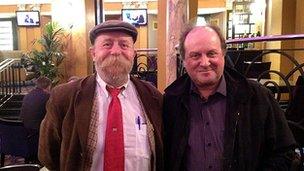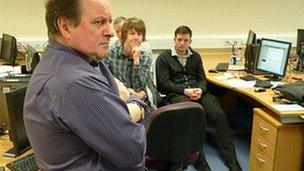James Naughtie on local newspapers: Change or decay?
- Published
- comments

<bold>As Johnston Press, one of the biggest regional publishers, predicts that more titles will disappear in the next few years, the Today programme's James Naughtie, a former newspaper man himself, examines the challenges and opportunities facing the UK's local press.</bold>
A few years ago, the newspaper and radio entrepreneur Sir Ray Tindle heard on the grapevine that the weekly West Wales Observer had gone bust, and was closing. Was it for sale?
He bought it on the spot, and persuaded the staff to get out the next edition at two days' notice. And he did something else. He restored the original name, the Tenby Observer. It's publishing still.
Sir Ray, who owns about 200 weekly newspapers and has been in the business for 65 years, is a phenomenon. He is an optimist, and cares about newspapers.

James meets Pete Lazenby
He wanted the Tenby Observer to get its original name back because it had fought a notable battle in 1908 - getting the law changed to allow journalists access to public meetings from which some authorities had been excluding them.
The story is a useful antidote to the pessimism that has settled over regional newsrooms, reminding everyone that there is still life in old newspapers, and there is still a reason for cherishing them.
They need all the help they can get. With a remorseless plunge in advertising revenue, newspapers - particularly evening titles - have been in decline for many years. A number of publishing groups, who used to extract healthy profits from the business, are responding the shift from print to the web, and the recessionary bite, by swinging an axe.
Editors' jobs going in Edinburgh and Leeds, dailies turning into weeklies in the East Midlands, jobs disappearing in Lancashire and Birmingham, on-line editions taking over from street sales. Shrinkage everywhere.

James Naughtie gives some words of advice to trainee journalists in Leeds
I took a little trip to the north of England, and inhaled some of that gloom, but I also discovered some cause for hope.
Sitting in Leeds with Pete Lazenby, veteran Yorkshire Evening Post man, we shared stories of the days of ink and hot metal type, when deadlines were attended by the clatter of the presses starting up and papers seemed to be the engines of their communities.
Change is inevitable - who can complain about a mobile phone or a computer? - but Pete regretted, with me, the passing of some of the crusading spirit. Were the owners of today still interested in what newspapers were for?
<bold>Webward move</bold>
But I tracked down some optimistic souls not far away. At Leeds Trinity University College, where a respected training course for journalists has been running for 20 years, I found a group of postgraduate students who were brimming with enthusiasm for the trade - committed to print, and to the business of good writing and brave journalism.

Jesmond's hyperlocal bloggers
Suitably cheered up, I headed for Newcastle-upon-Tyne.
In another era, I was a graduate trainee there before being sent to my first paper in Aberdeen, and I think the first story I ever had published was in the Evening Chronicle, a court report about a 15-year-old fire-raiser.
They were happy days in the Bigg Market and I was one of many, in Fleet Street and in broadcasting, who passed that way. The Chronicle today is different - only one edition, published at breakfast time. But its sales are decent, and it has a good website for breaking news.
Darren Thwaites, the editor, runs a paper that still covers the city with gusto - its burghers and people, its crime and its football - but the shift is webwards. And how do you make it pay? No-one has cracked the conundrum yet.
James Naughtie reports on the fate of local newspapers
At a national level the Times finds its paywall an impediment to readers; the Guardian finds its world-renowned website is a financial drain. Until that problem is solved, the squeeze on the regional press will continue.
So where are the signs of life? At Jesmond Cricket Club, in the north of the city, I found some. A community website and newspaper, deliberately small, which is trying to give do-it-yourself journalism a good name.
Ian Wylie, who's worked in Fleet Street and freelanced for national papers, is running boot camps for local enthusiasts who want to help to run the website and an accompanying magazine - Jesmond Local. They know people want it, and they know that it's filling a gap left by the shrinkage of the established regional press.
We spent a happy evening, and I came away cheered up.
People still want to be journalists. There's life in some of the old papers, and there are new ones on the way. Don't let's wallow in gloom. All is not yet lost.
- Published25 April 2012
- Published16 April 2012
- Published17 November 2011